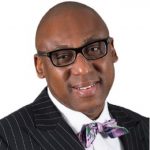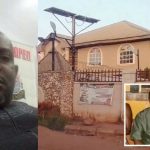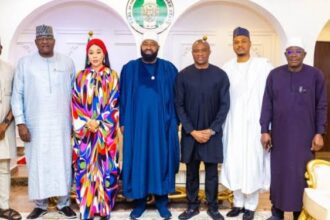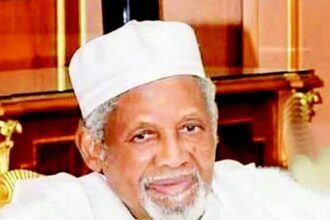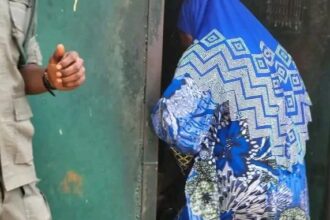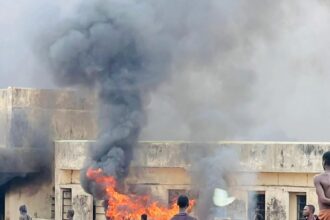...To get all news updates, Join our WhatsApp Group (Click Here)
Also Join our WhatsApp Channel (Click Here)
By: Fejiro Oliver
The equal right of all citizens to health, education, work, food, security, culture, science, and wellbeing – that is, the same rights we proclaimed when we began our struggle, in addition to those which emerge from our dreams of justice and equality for all inhabitants of our world – is what I wish for all.
Fidel Castro
This is a long write-up for intellectuals who can research and not those who dwell in shallow arguments.
For two years, I purposely stayed away from writing as an individual on issues that bothered about the health sector in Nigeria, to enable me research on the true international best practices and come out with an informed and none bias position.
Apart from education and defense, the most important aspect of a country is its health sector. Sadly enough, the sector in Nigeria has been bedeviled by animosity and fierce battle between the two prominent groups, namely; Joint Health Sector Union (JOHESU) and the Nigerian Medical Association (NMA).
JOHESU consists of all workers in the hospitals apart from Physicians and Dentists who make up NMA. I have decided to skip the word ‘doctor’ for a reason, which will be explained later. Nigeria is currently shut down with death toll rising every twenty four hours since JOHESU embarked on their strike last week. Despite the Federal Government refusal to pay them April salaries, they are bent on not going to work, until their demands are met.
The argument from both sides is reasonable, depending on the prism through which one views it. JOHESU is insisting that the FG honors all the agreement it reached with them, especially as it has to do with allowing their members to reach consultancy level, upward review of the CONHESS salary as agreed with FG, retirement age at 65 and few others. NMA on the other hand believes that the increment in salary for JOHESU will place them at par. They have also fought some JOHESU professionals from attaining consultancy status as well as using the prefix ‘Doctor’ before their name.
First of all, who is a Doctor? The word was never a medical word from origin. It is a Latin word from 1300, which means “Church father,” from Old French doctour, from Medieval Latin doctor “religious teacher, adviser, scholar,” in classical Latin “teacher,” agent noun from docere “to show, teach, cause to know,” originally “make to appear right,” causative of decere “be seemly, fitting,” from PIE root dek- “to take, accept”, as defined by etymonline. When the art of healing came into serious practice, the word ‘Doctor’ was used to replace the word ‘leech’, which they were initially called.
It therefore brings us to the argument on those entitled to use the suffix ‘Dr’ before their names in the health sector. First of all, it’s an acceptable fact that no one went to school to study ‘doctoring’. Unlike Engineers who derived their title from their course of study, this is not entirely so in the health sector. In the school of health or school of medicine, as it’s called in different universities, the courses are Medicine, Pharmacy, Dentistry, Nursing, Medical Rehabilitation or Physical Medicine, Radiography, Medical Laboratory and Optometry. None of these courses is called Doctoring.
The word Doctor came to be associated with the art of healing in the medieval period and were initially called Physician and still called so till date. With the advent of Doctor of Philosophy which is the highest level associated with teaching, it later became ascribed to those saddled with the art of healing. The question now bothers to who is a healer in the health profession and who is a paramedic; a degrading word that has been used many times by Nigerian Physicians to spite other medical workers, who retaliates by calling them Allopathic officers.
In line with international best practices, only the World Health Organisation (WHO) not World Medical Association and International Labor Organisation (ILO) can define the meaning of every profession. In listing structures for each worker, all professionals were listed as ‘Health Professionals’ and not ‘Medical Professionals’. They were divided into two health groups for easy recognition. The first group listed:
Medical Doctors (Generalist Medical Practitioners and Specialist Medical Practitioners), Nursing and Midwifery Professionals, Traditional and Complementary Medicine Professionals, ***Paramedical Practitioners and Veterinarians
The second group listed Dentists, Pharmacists, Environmental and Occupational Health and Hygiene Professionals, Physiotherapists, Dieticians and Nutritionists, Audiologists and Speech Therapists, Optometrists and Ophthalmic Opticians and Health Professionals Not Elsewhere Classified.
Note that Dentists which is a member of NMA is in the second category and Paramedics in the first category, according to International best practices that we like to flout.
Let us take a look at WHO definition of these core workers in the health sector.
According to WHO, ‘a Generalist medical doctors (including family and primary care doctors) diagnose, TREAT and prevent illness, disease, injury, and other physical and mental impairments and maintain general health in humans through application of the principles and procedures of modern medicine. They plan, supervise and evaluate the implementation of care and treatment plans by other health care providers. They do not limit their practice to certain disease categories or methods of treatment, and may assume responsibility for the provision of continuing and comprehensive medical care to individuals, families and communities’.
Same WHO notes that ‘Nursing professionals provide TREATMENT, support and care services for people who are in need of nursing care due to the effects of ageing, injury, illness or other physical or mental impairment, or potential risks to health, according to the practice and standards of modern nursing. They assume responsibility for the planning and management of the care of patients, including the supervision of other health care workers, working autonomously or in teams with medical doctors and others in the practical application of preventive and curative measures in clinical and community settings’.
Going down to traditional level, WHO was direct when it stated that ‘Traditional and complementary medicine professionals examine patients and prevent and TREAT illness, disease, injury and other physical, mental and psychosocial ailments by applying knowledge, skills and practices acquired through extensive study of the theories and experiences originating in specific cultures. They research, develop and implement treatment plans using applications such as acupuncture, ayurvedic, homoeopathic and herbal medicine’.
For Dentists, the world body noted that ‘Dentists (including dental surgeons and related) diagnose, TREAT and prevent diseases, injuries and abnormalities of the teeth, mouth, jaws and associated tissues by applying the principles and procedures of modern dentistry. They use a broad range of specialized diagnostic, surgical and other techniques to promote and restore oral health’.
According to its supreme definition, ‘Pharmacists store, preserve, compound and dispense medicinal products. They counsel on the proper use and adverse effects of drugs and medicines following prescriptions issued by medical doctors and other health professionals. They contribute to researching, testing, preparing, prescribing and monitoring medicinal therapies for optimizing human health’
For Physiotherapists, WHO didn’t mince word saying that ‘Physiotherapists assess, plan and implement rehabilitative programs that improve or restore human motor functions, maximize movement ability, relieve pain syndromes, and treat or prevent physical challenges associated with injuries, diseases and other impairments. They apply a broad range of physical therapies and techniques such as movement, ultrasound, heating, laser and other techniques. They may develop and implement programmes for screening and prevention of common physical ailments and disorders. ILO in classifying their job stated that “Physiotherapists and related associate professionals TREAT disorders of bones, muscles and parts of the circulatory or the nervous system by manipulative methods, and ultrasound, heating, laser or similar techniques, or apply physiotherapy and related therapies as part of the treatment for the physically disabled, mentally ill or unbalanced.
For Optometrists, the world body says Optometrists and ophthalmic opticians provide diagnosis, management and TREATMENT services for disorders of the eyes and visual system. They counsel and advise on eye care and safety, and prescribe optical aids or other therapies for visual disturbance.
While this may sound as a thesis, I will leave out what the sacred definition of WHO and ILO gave to the two eyes of medicine, notably Radiography and Medical Laboratory. The reader can Google it up.
By this definition, five professions TREAT sicknesses and disorders and one provides the drugs or body gel they prescribe, while two gives a clearer picture of the diagnosis through tests and imaging.
They are General Practitioner called Medical Doctor, Traditional or complimentary medicine practitioners/Homeopathy, Dentists, Nurses, Optometrists and Physiotherapists. Nursing being a unique and distinct profession cannot be called Doctors, but the rest whose primary duties is to diagnose treat and certify fit can be called Doctor if their regulatory body so wish.
On consultancy status, it is criminal for a profession to demand for such almighty position simply because of the years spent in service and not by merit. It’s akin to saying a lecturer can rise to the level of Professorship without studying to get PhD. This is where I disagree with JOHESU. Medical Doctors who are consultants didn’t jump the rope. They went through the rigors of residency training, became fellows and merited it.
Medical practice is not law that is determined by the years of practice. It is study, quest to break medical grounds and solve the everyday health challenges that the world faces. No amount of experience can totally give clinicians that except devotion to knowledge, which is gained through the appropriate postgraduate school or colleges.
It is however unjust for the current disparity in salaries of the two warring groups. Whoever separated the salary structure into CONMESS and CONHESS is the common enemy that we should be fighting today. It’s absurd and ridiculous that a House Officer will earn higher than a working class Nurse or any other core medical practitioners, when the difference in study is one year. Only a specialist GP should be allowed to earn more than any other clinician, who refuses to also specialize in his/her own field.
The FG should as a matter of urgency make all health workers one salary structure, and their wages determined by level of qualification and specialty. The Ministry of Health should be headed by hospitals administrators and not physicians, just as the hospitals should not also be headed by a Dentist or Nurse. For heaven sake, it’s a profit making venture and not a professional body that the Medical Doctors heading it have turned it to. Only the Chief Medical Advisory Committee (CMAC) head should be a Physician while the Deputy CMAC should be from other clinical department like Medical Laboratory or Pharmacy.
International best practices that we scream always have proven that the top countries in medical field do not have any health worker as their Minister or Head of health sector. Oh, what about the almighty WHO that defines health, the head is not also a medical doctor, but a biologist. If WHO was a Nigerian union, it’s crystal clear that there would have been strike if a Nurse is appointed the head. What then are we saying?
As for JOHESU, calling off the strike now will forever bring your union to doom. Let the government stop salaries till next year, but do not give in to threats and blackmail. Your requests apart from ‘consultancy by years of service’ are just, and Nigerians are solidly behind you, even though we are the ones that ultimately feel the pain. There’s unity in strength and this is the time to be united. The battle is not against NMA but the Federal Government who reserves the right to implement your demands. Every profession is independent of each other and this right to decency of work cannot be taken from you, not now, tomorrow or in the future.
To be continued…
These little things matter…
Fejiro Oliver, an Investigative Journalist, Media Consultant and Human Rights Activist is also the Co-Convener of Coalition of Human Rights Defender (CHORD) and can be reached on +2348022050733 (SMS ONLY) or secretsreporters@gmail.com. Engage him on twitter on @fejirooliver86.
You can get every of our news as soon as they drop on WhatsApp ...To get all news updates, Join our WhatsApp Group (Click Here)
Also Join our WhatsApp Channel (Click Here)





